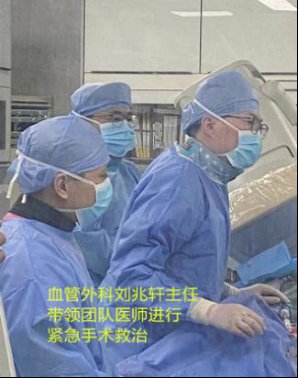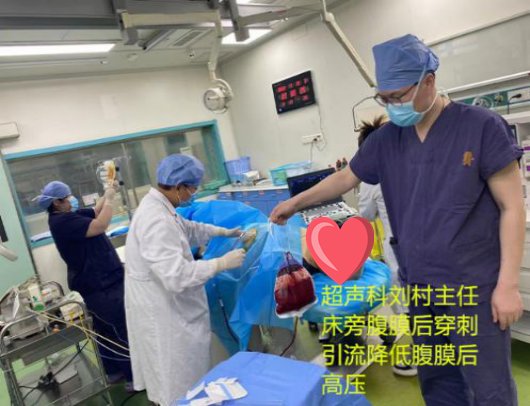Reporter Wang Xiaomeng correspondent Zhao Meiguan Tianxing
67-year-old patient Liu, from Feicheng, was diagnosed with abdominal aortic aneurysm in a local hospital and transferred to a hospital in Jinan. Hospital. Two days later, the patient had severe abdominal pain, and the examination considered threatened rupture of the abdominal aortic aneurysm. He urgently contacted Jinan Central Hospital and was referred to the Department of Vascular Surgery for treatment.
At 18:00 on March 19, 2022, after the patient completed the aortic CTA, the imaging data of vascular surgery reconstruction showed that the abdominal aortic aneurysm ruptured. The attending physician Wu Ding urgently communicated with the patient’s family to sign. Due to the critical condition, Deputy Chief Physician Liu Zhaoxuan urgently asked for instructions from Vice President Hua Yongxin, who was in charge. President Hua requested that the patient’s condition is urgent and critical, open a green channel, and go all out for active treatment.
After careful study and discussion, Chief Physician Meng Qingyi of Vascular Surgery, Deputy Chief Physician Liu Zhaoxuan, Chief Physician Wu Ding and Lu Donglin, and resident Physician Liu Xiwen decided to perform minimally invasive abdominal aortic balloon surgery for this patient. Occlusion + endovascular isolation of abdominal aortic aneurysm surgery.
During the course of the patient’s consultation, the patient experienced aggravated abdominal pain, restlessness, pale limbs, decreased peripheral arterial pulse, and progressively decreased blood pressure. The effect of morphine injection was not good. Director Meng Qingyi judged that the patient’s current abdominal aortic aneurysm ruptured and was in hemorrhagic shock, and his condition was urgent and urgent. At 18:45, under the leadership of Director Meng Qingyi and Deputy Chief Physician Liu Zhaoxuan, the Vascular Surgery Team, Interventional Nurses, Technician Team, and Anesthesiology Physician Dr. Liu Man were calm and tacit, and urgently performed balloon occlusion of the abdominal aorta to avoid abdominal aorta. Excessive blood loss in the aorta, intraluminal isolation of abdominal aortic aneurysm, intratumoral coil embolization, and surgical glue injection were performed. It took about 2 and a half hours to successfully remove the patient’s “body bomb”.


The patient suffered from massive arterial hemorrhage and a large amount of blood loss. Before surgery, he urgently contacted Director Xing Youzhong of the Department of Blood Transfusion to provide Sufficient blood products were prepared urgently for the patient. The patient suffered from massive retroperitoneal hemorrhage and a sharp increase in intra-abdominal pressure. To avoid persistent retroperitoneal hypertension, Deputy Chief Physician Liu Zhaoxuan contacted Director Liu Cun of the Ultrasound Department for interventional bedside retroperitoneal puncture and catheterization, and 1500ml of hemorrhagic non-condensable fluid was drained in only 10 minutes. After surgery, physician Yang Yongjian from the Department of Anesthesiology performed autologous blood filtration and recovery infusion for the patient to further reduce blood loss.

After the operation, the patient was transferred to the ICU, and the ICU Chief Physician, Gao Guangsheng, Qi Lei, and Ren Tiantian continued to give the patient after discussion. Infusion of a large amount of blood products, continuous ventilator auxiliary support, and continuous hemodialysis to remove toxins from the body. The patient’s cardiac function was corrected after two days of treatment, but the persistent retroperitoneal hypertension caused the patient to have extremely high inflammatory markers and obvious abdominal distension. Chief physician Si Min said that there are still a lot of toxins in the patient’s body after hemodialysis, and bedside hemofiltration alone may not be able to save the patient. Life, Director Simin pointed out that the patient may already have intestinal ischemia and intestinal necrosis, leading to severe intra-abdominal infection, and exploratory laparotomy should be actively performed. Removal and retroperitoneal decompression, various measures are conducive to the recovery of gastrointestinal function.
On the afternoon of March 22, under careful anesthesia by Director Meng Fanjun and Deputy Chief Physician Ge Yuan in the operating room, Director Guo Peiming of the Second Division of Gastrointestinal Surgery led Deputy Chief Physician Liu Zhaoxuan and Chief Physician Wu Ding to conduct an exploratory laparotomy. Dark red effusion with foul odor was seen in the abdominal cavity, left colon ischemic necrosis, and the patient’s condition was complicated. After comprehensive judgment, Chief Physician Guo Peiming performed partial transverse colon, left colon and most of the rectal resection, distal to the proximal fistula, and performed peritoneal irrigation and perfusion, and retroperitoneal decompression for hematoma evacuation. After the operation, the ICU Director Si Min’s team continued to provide treatment such as correction of abdominal infection, active blood transfusion, continuous bedside hemofiltration, and albumin infusion to correct hypoalbuminemia. After nearly 27 days of rescue treatment in the ICU, the patient’s condition was stable, and the postoperative recovery was good. On April 18, 2022, he was transferred back to the general ward. Follow-up vascular surgery will continue to correct gastrointestinal function and prevent complications such as deep vein thrombosis and urinary tract infection.

Deputy Chief Physician Liu Zhaoxuan introduced: Abdominal aortic rupture is an extremely dangerous disease with a very high mortality rate. The main causes include: abdominal aortic aneurysm, abdominal Aortic dissection, abdominal aortic pseudoaneurysm, abdominal aortic trauma, etc. After the rupture of the abdominal aorta, severe abdominal pain will occur in the initial stage. Due to the retroperitoneal pressure, hemorrhagic shock and retroperitoneal hypertension will not occur immediately. , circulatory failure and death occur in a very short period of time, and the short-term mortality rate of such patients without timely treatment is almost 100%.
The successful treatment of this patient with ruptured abdominal aortic aneurysm fully demonstrates the superb skills and courage of the vascular surgery team of Jinan Central Hospital, and it is also the result of the multi-disciplinary collaborative operation of the whole hospital.